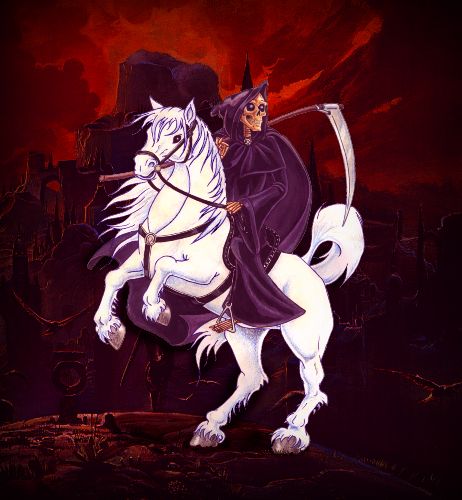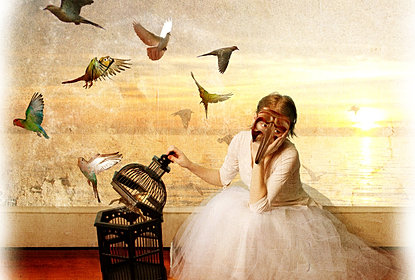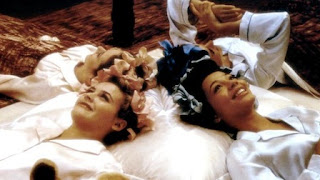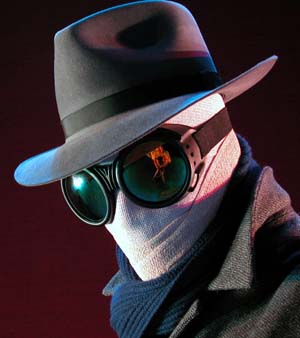Death is fascinating. To each of us, Death may bear curiosity, fear, fascination, horror, sometimes longing, disgust, sorrow, and respite. Oh, look . . . I just personified death.
Personification is actually quite easy. It's one of the rhetorical devices that we each learn in grade school. One of the rhetorical devices we actually remember. And one that many of us actually use. Many inanimate objects sit comfortably among the halls of those that are personified. For example, the wind cutting through me, snowflakes nipping at my nose, foreboding branches clawing at my face, the dust whispering as my feet stir up its words. But (if personification really did have a hall like the Hall of Fame) it would be Death who sat at the head, ruling as the most common, powerful, and frightening personification, humankind continually reverts to.
Death is everywhere in literature. "Death be not proud," commands the "10th Holy Sonnet" of John Donne. In
A Christmas Carol Scrooge cowers before his third ghost. essentially Death, and, trembling at the eventuality of death, asks: "Are these the shadows of the things that
Will be, or are they shadows of the things that
May be only?" (pg. 117). In Milton's
Paradise Lost Satan confronts Sin, his mistress, and Death, his son, and Sin explains her fearful offspring saying, "I fled, and cry'd out, DEATH! / Hell trembled at the hideous name, and sigh'd / From all her caves, and back resounded, DEATH!" (Book 2, line 787).
And even though these personifications of Death are masterful, my two of my favorite personifications of death are Terry Pratchett's DEATH in the Discworld Series and Marcus Zusak's Death in
The Book Thief. The differences in the characterization, function, and appearance of these two literary Deaths are fascinating. I'll begin with Terry Pratchett's DEATH.
So Terry Pratchett is a British satirist who has spent his entire writing career creating the Discworld. There are dozens of books forming a canon of stories revolving around Discworld. What ties all these books together is the world itself. Many books share the main character, some following a cooky magician named Rincewind, or a trio of witches, or Commander Vimes, or even DEATH. But interestingly, DEATH is the one character who is always present no matter how small his role in the book may be.
Mort is the first book in DEATH's series. In the introduction of the book Terry Pratchett describes the world where his DEATH resides: "This is the Death whose particular sphere of operations is, well, not a sphere at all, but the Discworld, which is flat and rides on the back of four giant elephants who stand on the shell of the enormous star turtle Great A'Tuin, and which is bounded by a waterfall that cascades endlessly into space. Scientists have calculated that the chance of anything so patently absurd actually existing is millions to one. But magicians have calculated that million-to-one chances crop up nine times out of ten."
So who is Terry Pratchett's DEATH?
Well for starters, he's fairly typical . . . at least physically. It follows suit that a Terry Pratchett DEATH would not only be in capital letters (we'll come back to that later) but would follow all the conceptions that we have when thinking of death. For example, DEATH carries a scythe, he wears a black cloak, he's frightening and therefore usually ignored out of everyone's perception of reality, and he's a skeleton. Perhaps a little different is that he has in his eye sockets two glowing blue orbs that serve as his eyes.

On the surface, it seems that this personified death is pretty standard. But, also following Terry Pratchett's style is to take typical thought or belief and flip it on its head. So even though DEATH looks like a grim reaper, he's actually pretty quirky. First, he has no sense of humor. This makes sense. But at one point in Mort he starts to long for the simple pleasures of life, like a normal job, humor, a cat. So he gives his job to his apprentice. Okay, that sentence had a whole list of quirks. DEATH wanting a normal job? Yep. He even goes to a job agency: "I ushered souls into the next world. I was the grave of all hope. I was the ultimate reality. I was the assassin against whom no lock would hold. "Yes, point taken, but do you have any particular skills?” He also likes cats. Odd. "I meant," said Ipslore bitterly, "what is there in this world that truly makes living worthwhile?" Death thought about it. Cats, he said eventually. cats are nice." And finally, DEATH has an apprentice. Hmm, weird. But okay! (Yeah, that was my thought process too.) His apprentice's name is Mort, how fitting.

So hopefully you've noticed something else as well. I purposefully have been capitalizing DEATH for Terry Pratchett do that we can distinguish between two very different characters (The Book Thief Death, and Terry Pratchett's DEATH). But Terry Pratchett thought of that visual distinction first. Because every time DEATH speaks, his words are in small caps. It's as though his very being infuses the words with an obvious power. His voice has a finality that Terry Pratchett allowed to exist on the page of his books. Pretty cool in my opinion.
 Before we move on, a few more tidbits for you. DEATH knows when a human's time is up by his collection of hourglasses. Everyone has one. DEATH's favorite food is arguably curry. Mort found this our one of his first days as an apprentice: "Death leaned over the saddle and looked down at the kingdoms of the world. I don't know about you, he said, but I could murder a curry." DEATH also realizes that he is a personification. Super witty! (Then again, wit is kind of Terry Pratchett's embodied.) "It is a fact that although the Death of the Discworld is, in his own words, an anthropomorphic personification, he long ago gave up using the traditional skeletal horses, because of the bother of having to stop all the time to wire bits back on." And that's the final quirk I'll mention: DEATH has a horse named Binky.
Before we move on, a few more tidbits for you. DEATH knows when a human's time is up by his collection of hourglasses. Everyone has one. DEATH's favorite food is arguably curry. Mort found this our one of his first days as an apprentice: "Death leaned over the saddle and looked down at the kingdoms of the world. I don't know about you, he said, but I could murder a curry." DEATH also realizes that he is a personification. Super witty! (Then again, wit is kind of Terry Pratchett's embodied.) "It is a fact that although the Death of the Discworld is, in his own words, an anthropomorphic personification, he long ago gave up using the traditional skeletal horses, because of the bother of having to stop all the time to wire bits back on." And that's the final quirk I'll mention: DEATH has a horse named Binky.
The Book Thief has a very different idea of Death.
Set in WWII, The Book Thief follows the story of a young girl whose father was a communist and whose mother has to give her up for adoption because she's running, Liesel's younger brother dies before they reach their new home and she steals her first book at his frozen train-side grave: The Gravedigger's Handbook. Her story amid Hitler's influence in her small German town, and her struggle as her family harbors a Jew is captivating for everyone . . . including Death.
Unlike DEATH in Discworld, Death does not have a witty undertone or quirky traits. He is also not the main character. Rather, he is the narrator. This is an interesting way to tell Liesel's story because of the unique insight Death has into everyone's lives, especially those who come in contact with Liesel. Death is also not what he seems.
I was sitting in the movie theater watching a random film everyone said was really great. As the previews ended and the movie began a beautiful, soft, male voice spoke from the screen. It was Death; I have never thought of him the same again.
So what made such an impression? What is so different about Marcus Zusak's Death? Let's begin with his physical description.
This is a photographic excerpt from the book. If you've never read it, Death will often make comments of truth, his opinions, thoughts, foreshadowing, basically anything important, and they will be placed in this format. So this is Death's description of himself. I've never been quite sure what to make of it. But needless to say, it's a fascinating way to think about Death.
Death also will describe the world in color.
“***A SMALL THEORY***
People observe the colors of a day only at its beginnings and its ends, but to me it's quite clear that a day merges through a multitude of shades and intonations, with each passing moment. A single hour can consist of thousands of different colors. Waxy yellows, cloud-spat blues. Murky darknesses. In my line of work, I make it a point to notice them. ”
 At one point Death describes Rudy's hair as the color of Lemons, at another time he says, "The day was gray, the color of Europe." And when describing humans he simply says, "So many humans. So many colors." Its peculiar to think of Death as one who would notice color. A black-and-white, death-or-life, figure and he thinks in color. And why does he think in color?
At one point Death describes Rudy's hair as the color of Lemons, at another time he says, "The day was gray, the color of Europe." And when describing humans he simply says, "So many humans. So many colors." Its peculiar to think of Death as one who would notice color. A black-and-white, death-or-life, figure and he thinks in color. And why does he think in color?
Death: "Personally, I like a chocolate-covered sky. Dark, dark chocolate. People say it suits me. I do, however, try to enjoy every color I see - the whole spectrum. A billion or so flavors, none of them quite the same, and a sky to slowly suck on. It takes the edge off the stress. It helps me relax."

So here are some of my final thoughts on The Book Thief's Death. He is kind. He notices color to relax. He tries to avoid humans but remains fascinated by them. His appearance does not follow our stereotypical perception of him. Instead, we must find a mirror to see him. He insists that "even Death has a heart." And as he carries souls he can simultaneously say, "It kills me sometimes, how people die," and "Humans, if nothing else, have the good sense to die." At one point Death expresses the duality of existence: "I wanted to tell the book thief many things, about beauty and brutality. But what could I tell her about those things that she didn't already know? I wanted to explain that I am constantly overestimating and underestimating the human race - that rarely do I ever simply estimate it. I wanted to ask her how the same thing could be so ugly and so glorious, and its words and stories so damning and brilliant." In The Book Thief, Death is the great observer, the one who much watch. But, most of all Death is curious and compassionate, leaving him "haunted by humans."

Death as a corporeal frame haunts our fairy tales, our fantasy novels, our poetry, our plays. The universal antagonist, Death keeps ever present in our minds the fact that we must each live our lives and eventually die. And that knowledge creates a frightening as well as exciting transition we don't understand. This is why Death can live in literature. We continually seek to understand and contain the concept of death, literally leading to a personification: Death as one of us. And I think in the process we've stumbled on some truth. We may end our lives weary, but at least we eventually find rest. I doubt we will ever be as weary as Death who whispers, "My heart is so tired" and he cannot die. Though we may not think of DEATH's loneliness, Mort does. "It struck Mort with sudden, terrible poignancy that Death must be the loneliest creature in the universe." I doubt we will ever be as lonely as DEATH, because at least we have the unity of each facing life together, though we must each face death separately. All I know is I hope Death is something like the personifications in Marcus Zusak's and Terry Pratchett's imaginations, the witty and compassionate Death that lives in literature.
-Natalie Cherie






























